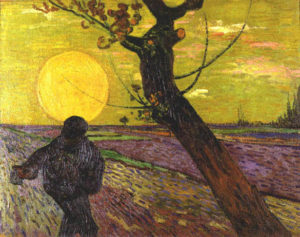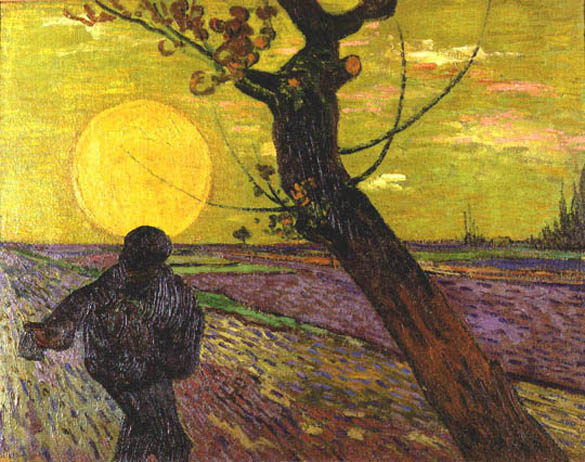Meditations on themes from the Parable of the Sower & the Seed
Reflections on hard earth and fertile ground: sowing seeds, putting down roots, growing shoots … putting parables to work in current times.

The Sower by VanGogh
A Short Story of Falling — Alice Oswald
It is the story of the falling rain
to turn into a leaf and fall again
it is the secret of a summer shower
to steal the light and hide it in a flower
and every flower a tiny tributary
that from the ground flows green and momentary
is one of water’s wishes and this tale
hangs in a seed-head smaller than my thumbnail
if only I a passerby could pass
as clear as water through a plume of grass
to find the sunlight hidden at the tip
turning to seed a kind of lifting rain drip
then I might know like water how to balance
the weight of hope against the light of patience
water which is so raw so earthy-strong
and lurks in cast-iron tanks and leaks along
drawn under gravity towards my tongue
to cool and fill the pipe-work of this song
which is the story of the falling rain
that rises to the light and falls again
On Parables & Seeds
Not every end is the goal. The end of a melody is not its goal, and yet if a melody has not reached its end, it has not reached its goal. A parable. — Frederick Nietzsche
To paraphrase Muggeridge: Everything is a parable that God is speaking to us, the art of life is to get the message. ― Chester Elijah Branch
Each day of my life I am sowing seeds that one day I will harvest. — Gautama Buddha
Don’t judge each day by the harvest you reap but by the seeds that you plant. — Robert Louis Stevenson
A lower power cannot compass the full understanding of a higher. But to limit one’s belief to the bounds of one’s own small powers, would be to tie oneself down to the foot of a tree, and deny the existence of its upper branches. ― Mrs. Alfred Gatty, ie, Margaret Scott
Every problem has in it the seeds of its own solution. — Norman Vincent Peale
If you can look into the seeds of time, and say which grain will grow and which will not, speak then unto me. — William Shakespeare
Being an American is a state of mind, and to be in a family is to feel the power of belonging, the power of your roots. Family is a tree, the strength of a tree, the roots, the leaves, the past, the present, the future, the fruits, the seeds. — Esai Morales
He [Jesus] speaks in parables, and though we have approached these parables reverentially all these many years and have heard them expounded as grave and reverent vehicles of holy truth, I suspect that many if not all of them were originally not grave at all but were antic, comic, often more than just a little shocking. ― Frederick Buechner, Telling the Truth: The Gospel as Tragedy, Comedy, and Fairy Tale
Throughout the parables the paradoxical teachings continue: Give to receive. Die to live. Lose to win. ― Amos Smith, Healing the Divide: Recovering Christianity’s Mystic Roots
Maybe that’s why Jesus was so fond of parables: Nothing describes the indescribable like a good yarn. ― Cathleen Falsani, Sin Boldly: A Field Guide for Grace
A journey or pilgrimage also follows the parabolic curve of an arch: it swings out from a known point and returns symmetrically to a point on the same line or plane, but farther along. For this reason, ancient philosophers chose the arch as a symbol for the process of interpretation. That is why teaching stories, such as those of Jesus or Buddha, are known as parables. ― John Tallmadge, The Cincinnati Arch: Learning from Nature in the City
A Parable — Arthur Conan Doyle
The cheese-mites asked how the cheese got there,
And warmly debated the matter;
The Orthodox said that it came from the air,
And the Heretics said from the platter.
They argued it long and they argued it strong,
And I hear they are arguing now;
But of all the choice spirits who lived in the cheese,
Not one of them thought of a cow.
Parable of the Hostages — Louise Glück
The Greeks are sitting on the beach
wondering what to do when the war ends. No one
wants to go home, back
to that bony island; everyone wants a little more
of what there is in Troy, more
life on the edge, that sense of every day as being
packed with surprises. But how to explain this
to the ones at home to whom
fighting a war is a plausible
excuse for absence, whereas
exploring one’s capacity for diversion
is not. Well, this can be faced
later; these
are men of action, ready to leave
insight to the women and children.
Thinking things over in the hot sun, pleased
by a new strength in their forearms, which seem
more golden than they did at home, some
begin to miss their families a little,
to miss their wives, to want to see
if the war has aged them. And a few grow
slightly uneasy: what if war
is just a male version of dressing up,
a game devised to avoid
profound spiritual questions? Ah,
but it wasn’t only the war. The world had begun
calling them, an opera beginning with the war’s
loud chords and ending with the floating aria of the sirens.
There on the beach, discussing the various
timetables for getting home, no one believed
it could take ten years to get back to Ithaca;
no one foresaw that decade of insoluble dilemmas—oh unanswerable
affliction of the human heart: how to divide
the world’s beauty into acceptable
and unacceptable loves! On the shores of Troy,
how could the Greeks know
they were hostages already: who once
delays the journey is
already enthralled; how could they know
that of their small number
some would be held forever by the dreams of pleasure,
some by sleep, some by music?
